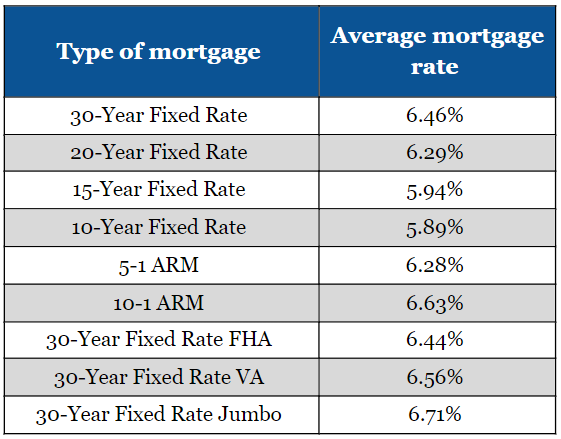It is not surprising for interest rates in the United States to fluctuate over time. What about the average mortgage rates? Read on to find out

The average mortgage rates depend on numerous factors, including the broader economic outlook and the individual borrower. In turn, mortgage rates can fluctuate wildly not only within the same year—but within the same month as well. It can even move within the same week.
The Federal Reserve’s move to increase the base interest rate to combat inflation has the biggest impact on why the average mortgage rates are high. While these factors are out of your control, there are steps you can take to decrease the interest rate of your home loan.
In this article, Mortgage Professional America will explore all that you need to know about the average mortgage rate. We will tackle why these rates are high and what you can do to lower your mortgage rates. For mortgage professionals who are our loyal readers, this guide to average mortgage rates is one of our client education series. Feel free to send this to any of your clients who might be interested.
Average mortgage rate
Currently, the average rate for a 30-year fixed mortgage is 6.46%. Here is a comparative table on other average mortgage rates for certain types of home loans:

Caption: Source: Bankrate
These numbers can fluctuate in a span of months or even weeks, especially during times of high volatility within the mortgage market.
Why are mortgage rates so high?
While there are many economic factors, the main reason why the average mortgage rates are high is because the Federal Reserve has been raising the base interest rate. They do this to combat inflation. In turn, banks are asked to pay more interest. To maintain their margins, banks then pass on higher rates to their customers.
The Fed is raising interest rates because the cost of living is rising too much, and raising rates will slow the economy. More expensive mortgages mean consumers have less money to buy other goods and services. And with lower revenues come less spending and fewer wage increases. It can even lead to an economic slowdown overall.
If you find that the average mortgage rate in your area is too high, check out our article on the ten states with the lowest average mortgage rates. Your dream home might just be in any of those states, just waiting to be discovered.
How can I lower my mortgage rates?
Lowering your mortgage rates can benefit you in many ways—whether you want to put the extra money toward a family vacation or for home improvements. Here are some ways to lower your mortgage rates, which can be done during the life of the home loan or at signing:
- shop around
- improve your credit score
- be selective with your loan term
- make a larger down payment
- purchase mortgage points
- lock in your interest rate
- refinance your mortgage
To better help you lower your mortgage rate, let us take a closer look at each.
1. Shop around
It is important to shop around when you are deciding on a mortgage. You should compare different mortgage products offered by several mortgage lenders. Shopping around is beneficial because every lender offers unique home loan products, each with unique fees and rates. By looking at all of them, you can find out the average mortgage rate in your area.
Below is a list of lenders that have varying mortgage products:
- mortgage banks
- portfolio lenders
- wholesale lenders
- credit unions
- other non-traditional lenders
Since mortgage rates fluctuate so often, contact various lenders on the same day and roughly the same time to get a better comparison. When calculating the possible savings, make sure to factor in any associated fees.
You may find, during your shopping, that some lenders excel at refinancing while others cater to new homebuyers. When choosing a lender, be sure that you compare your choices carefully. Assess your personal goals and financial situation. Listen to your mortgage broker and real estate agent.
When you conduct your own research, make sure you are securing the best deal for your needs.
2. Improve your credit score
If you have a high credit score, you are in a better position to get a desirable mortgage rate regardless of the type of home loan you decide to get. The reason why credit scores are important is because these figures help banks and mortgage lenders know your level of risk.
If you have a low credit score, you will be seen as a greater risk. As such, applicants with lower credit scores face higher interest rates. On the other hand, if you have a good credit score, you will be offered a lower interest rate.
The first step to improving your credit score is to review your credit report. This will determine if you have outstanding balances. If so, pay off those balances; pay promptly each month. If you detect any errors on your credit report, be sure to correct them. Make the adjustments to lessen the factors that can negatively affect your credit.
Curious to know more about credit scores? Read this article and learn everything you need to know about credit scores when buying a house.
3. Be selective with your loan term
Short loan terms are less of a risk and come with lower mortgage rates. In exchange for the lower mortgage rates, you will likely have higher monthly payments. This is because you are paying off the principal in less time. On the other hand, long-term mortgages spread out the payments over a longer period. This leaves you with lower monthly payments and higher interest rates.
Long-term home loans will also provide you with more disposable income each month, while short-term loans typically save you more in the long run. This makes a short-term loan a better bet if you are looking for low mortgage interest rates as well as savings over the life of the loan.
4. Make a larger down payment
You will owe less on the home loan if you make a larger down payment. It also means that you will have more equity in your property from the beginning. In that case, you will have to repay less principal. You will also pay less interest over the life of the mortgage, because it is calculated on the principal owed.
Of course, there are loan options with lower down payment requirements. Just remember, if you can afford a larger down payment, you will reduce your monthly payments and mortgage rates. A smaller down payment could paint you as ‘high risk’ for most banks and mortgage lenders. As such, you might have to pay a higher interest rate because lenders will see you as someone who might default on the mortgage.
Want to know more about paying a down payment to secure a home loan? How much should you save for a down payment for a house? Check out everything to know about down payments for a house—requirements, history, and tips—when you watch this clip:
To help you make informed decisions, take the time to look at the mortgage professionals that we highlight in our Best in Mortgage section. Here you will find the top performing mortgage brokers in the country.
5. Purchase mortgage points
Purchasing mortgage points can be a good way to save money if you plan on owning your property for a long time. Mortgage points, which are paid at closing, have a value of 1% of your mortgage. In exchange, the monthly mortgage payment and the interest rate are reduced.
However, it could take time to recoup your savings. To determine this, you will have to keep your eye on the break-even point. This is the length of time needed for your total savings to add up to the cost of the points. The break-even point is mostly calculated in months. If the break-even point is longer than you plan to own the property, purchasing mortgage points might not be worth it.
Read our guide on mortgage points to learn more.
6. Lock in your interest rate
You can also lock in your interest rate to lessen the impact of the ever-changing mortgage rates in the US. Others do this before closing on the property. While it may cost you a fee, it could be worth it if you suspect that the average mortgage rates might shoot up.
The gamble is that it protects you from increasing mortgage rates but prevents you from benefiting from lower mortgage rates. Try to ask your mortgage lender about rate locks that contain float down provisions. This could give you a one-time opportunity to lower your locked-in rate to present market rates. Just be prepared as this might have an additional fee.
7. Refinance your mortgage
You may save money over the life of the loan if you renegotiate the terms of your mortgage. While there are many refinancing options open to you, there are also benefits and risks.
One option is to refinance your home loan with a fixed-rate mortgage. This is best if you are concerned about an upcoming increase in your adjustable-rate mortgage (ARM). It will also help you make consistent monthly principal and interest payments.
Another option would be to negotiate your fixed-rate mortgage at a lower interest rate. This will be more realistic if you are in a more stable financial situation than when you first signed your mortgage loan. It is also great if your credit score has improved or if the average mortgage rates have dropped.
To better suit your financial needs, you may want to renegotiate the length of your loan when refinancing a fixed-rate mortgage.
Since this strategy can be complicated, you need to understand the basics on how to refinance your home loan. In this video, a realtor will explain when you should refinance your mortgage and give some time-saving tips. Here are six times when refinancing makes sense:
Find out more about mortgage refinancing and whether you should do it in this article.
Deciding based on the average mortgage rate
While there are ways that you can lower your mortgage rate, there are also factors that increase and decrease the average mortgage rate that are beyond your control. But once you know what a good mortgage rate is, you will be able to make better informed decisions to secure the best rate for you.
It also helps when you fully understand why the average mortgage rates are currently as high as they are and what factors make them go up. As always, seek the advice of a trusted mortgage professional for expert guidance.
Do you think that the average mortgage rates in the US will climb or fall in the next decade? Share your insights in the comments section below.



